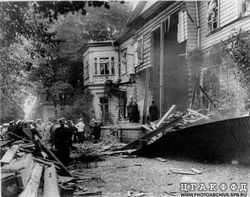Eye-witnesses maintained that after the March crisis, Stolypin became unrecognizable, reticent; his self-confidence seemed undermined, and he himself apparently felt that everybody around him was openly or surreptitiously hostile. He said that he could not sleep, that he suffered from nerves, and every trifle irritated him. Doctors found he had a heart illness, and the Tsar granted him permission to take a leave, which he spent in Kolnoberzh. 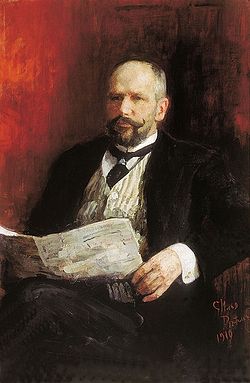
A portrait of Stolypin by Ilya Repin. 1919.
The completion of the territorial reform in summer/autumn of 1911 was to be marked with festivities in Kiev during which provincial deputies would be introduced to the Emperor, and thanks expressed to him.
Stolypin felt sad in Kiev. The prime minister and the finance minister Kokovtsev, who was with him there, were ignored when the celebrations program was drafted; they were not even provided with transportation. Stolypin said to Kokovtsev, "We are quite redundant here." On August 31, Stolypin informed him that the police had tried to "frighten him" with talk of a planned attempt at his life. Stolypin hardly ever trusted the police; once he even said: "If I am killed, it will be by some one from the security forces [assigned to guard his safety in Kiev --Ed.]"[1]; but again, he did not take any precautions.
At nine o'clock in the evening of September 1, a festive performance was given at the Kiev Opera House in the presence of the Emperor. The appearance of the Tsar with Grand Duchesses Olga and Tatyana and Prince Boris, the heir to the Bulgarian throne, was met with the thrice-sung "God, Save the Tsar" and "hurrah".
[2]
Dmitry Bogrov, an anarchistic terrorist and agent provocateur of the secret police, swiftly pulled a Browning out of his pocket. Stolypin kept facing him. Bogrov turned pale and fired two shots.
Stolypin was saved from instant death by the cross of the Order of St. Vladimir, which diverted the first bullet through his chest and lungs into the liver. The other bullet went through his right hand into the concertmaster's leg. Stolypin retained his presence of mind. He leaned on the table and began to unbutton his tunic. Having noticed a growing stain of blood on his chest, he waved it away as hopeless, sank into his chair, and ordered the gendarmes who rushed to him to catch the criminal.
The Tsar came back to his box immediately after the shooting. At that moment Stolypin appeared to remember something; he turned in the Tsar's direction, made signs of the cross over his family and himself, and lost consciousness. Doctors present at the theatre were already running to him, among them, Profs. Rein, Chernov, Obolensky, Makovsky, surgeon Galin and Dr. Afanasyev. They stopped the bleeding and carried the wounded on a stretcher to the ambulance. At this moment Stolypin regained his consciousness and uttered: "Tell the Tsar that I am happy to die for him and for my Motherland."[3]
Back at the theatre, cries of anger and indignation alternated with the sounds of the national anthem and the prayer "Save, O Lord, Thy People." Bogrov got two teeth knocked out and an eye battered and was nearly mauled but for the interference of gendarmes...
Was Stolypin's murder accidental? Yes and no. His tough policy would have certainly made terrorists attempt it again, particularly since there were resources for it, as an American millionaire by the name of Schif had forwarded 12 million dollars to the Leftist parties for their struggle against the autocracy, including 1.5 million to arrange Stolypin's assassination.[4] In that respect it was not accidental, because it was not at Stolypin they shot, but at Russia and Russian statehood. Bogrov himself stated during interrogation that he believed Stolypin to bear the primary responsibility for "the reaction," that is, the dissolution of the two Dumas, changes in the law on elections, persecution of the press, non-Russians, etc., but emphasized that his choice of the target in the theatre was accidental. In his death note to his relatives, he wrote that he would have eventually done it all the same. Analyzing the cause of the assassination, P. Struve wrote in those days: "Society did not feel the crime in Kiev to be anything of its own, and it was right, because the 'revolution' had evaporated there as a social movement to become a purely personal adventure of modern supermen. As a 'revolutionary act', Stolypin's assassination was perfectly accidental. What was not accidental was the role that fell to the lot of the so-called body-guard" (Russkaya mysl, 1911, No. 10).
Bogrov was a typical representative of the "golden youth" in Kiev. His father was a rich Jew, an attorney, who possessed a multistory building on Bibikovsky Boulevard, worth 400 thousand rubles. Bogrov received an excellent education in Kiev and Munich Universities, was fond of sports and chess. Apparently, having tasted all possible pleasures, he grew disappointed in life and entered the Anarchist Party. But soon he offered his services to the chief of the Kievan secret police, Kulyabko (during examination he explained this step by his need of money) and joined its staff as agent with a salary of 100-150 rubles a month. The further developments can be qualified as puzzles and hypotheses. A certain member of the organization came to Bogrov's place (Bogrov did not know his name and could only describe what he looked like). He informed him that the party suspected Bogrov of being an agent provocateur and condemned him to death. Bogrov could be rehabilitated only by assassinating Kulyabko or any other gendarme. Who was that man, and what he persuaded Bogrov to do is unknown. For some reason Bogrov chose not to kill Kulyabko, but misled his visitor by promising to give away a terrorist who planned to kill a certain minister during festivities in Kiev. Under this pretext, Bogrov managed to get from Kulyabko a pass to the theatre in spite of the strict order issued not to let "staff members" into the theatre. 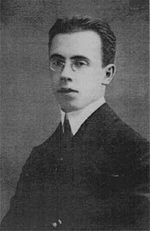
Dimitry Bogrov.
According to some revolutionaries, Bogrov was used through the secret police by the extreme Right court circles. Unfortunately, the investigation of Bogrov's case was carried out too hastily, and as early as the night of September 11, he was hanged at the Lysogorsky Fort. A few days later Kokovtsev, now the prime minister, learned that Nicholas II granted Kulyabko and other participants in the incident amnesty in order to mark the recovery of his heir.[5] Since then, all the versions of Stolypin's assassination have fallen within the province of supposition.
Bogrov belonged to that generation of revolutionary intelligentsia who, having no faith in their souls, deified not the people, nor the "masses," but their own selves as "supermen." The psychology of these people is clearly reflected by Elzbacher in his work, Anarchism (the chapter on the Young Hegelian and anarchist Max Stirner): "I do not recognize the call of duty. Man has no calling, no task, no vocation, just as a plant or an animal has no vocation. The only thing he has is power. There is no truth either. Truths are just phrases, formulae, empty words. A recognition of anything as truth is slavery. I alone am truth: I am more than truth; truth is nothing before me. The first commandment for man is this call to himself: I am your lord god. The second commandment is the call to the so-called 'neighbor': you are my food. Crime may be committed only against something sacred, but as there is nothing sacred, there is no crime; 'right' is an incurable disease inflicted by illusion. He who has power is above law. I have the right to do everything that is good for me. An object belongs to the one who can take it or keep it by force. Every man is unique, and he is god; he does everything for his own self. Therefore, I am a great enemy of the state, for it is my restriction, my slavery. I do not balk at property; on the contrary, I look at it as my property. All that I can capture is my possession. The way to realize this world-view is to overthrow the existing system by force and to kill all those who disagree with us. I declare the power over life and death to be mine."
All revolutions and all revolutionaries of all times made faith and God the first and the last objects of their destruction. In order to lead people to plunder and murder, and in order to affirm falsehood by violence and violence by falsehood, one has to erase the very notions of absolute Good and absolute Evil from people's consciousness, and then even plain cannibalism can be served under any philosophical sauce whatsoever. It is not accidental that Lenin, in speaking about revolutionary agitation, used the term "to inoculate"; that is to inoculate the masses with revolutionary ideology. Any revolutionary consciousness necessarily involves militant atheism. The fact that many Russian people fell away from the faith of their fathers cost us dear. Long decades of physical sufferings and spiritual thirst were needed before people could see again the light of true spirituality, which had never been extinguished in Orthodox churches, and feel the desire to be nourished by the word of God. This is the true meaning of Russia's purification and revival.
Stolypin spent his last days in the private surgery of Dr. Makovsky. The wounded man endured his torments stoically, without complaints or groans. Only occasionally did the doctors hear from him, "it hurts" or "I feel very dreary"... He did not think about his murderer, but repeatedly asked after the health of the wounded musician. He was conscious; he expressed the wish to receive Holy Communion, and said the prayers before it. According to his confessor, Father Pavel Levitsky, he made his confession and was communicated with profound, sincere faith and reverence, and made a sign of the cross with his unimpaired left hand. His last request to his confessor was: "Father, pray for my wife Olga; we lived well together."[6] 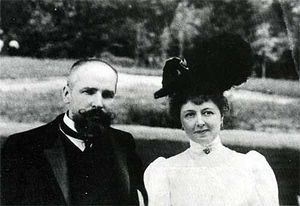
Stolypin and his wife, Olga Borisovna. 1906.
In those four days during which Stolypin was at death's door, all Russia was praying for him as was shown by hundreds of telegrams which came to his address in Kiev from bishops, clergymen and the faithful of the Orthodox, Old Believers', Catholic and Lutheran Churches, as well as from Moslems. The Orthodox Brotherhood of St. Aleksandr Nevsky in Dvinsk wrote in particular: "Having ardently prayed to the Almighty in the local cathedral, asking Him to grant recovery to Your Excellency, we assure you of our sincere sympathy with both you personally and the cause you are serving so invariably and unswervingly. God willing, your health will be restored, with new energy you will take the helm of state, and will not let it turn left and thus change the Russian national idea. God is with us; therefore, the enemies who treacherously attack underhand and those who betray the Russian banner will never prevail in the Russian land..." Incidently, among the surviving messages was that of the parishioners of the church in Chernobyl. Perhaps, if that prayer for Stolypin's recovery had been answered, the land of Chernobyl would not have found itself ruined seventy five years after...[7]
On the morning of September 5, doctors had a consultation and established that their further efforts were hopeless: Stolypin was doomed. His pulse was fading, and his life was only sustained by stimulants. Blood accumulated between his liver and diaphragm; his heart was stopping. Soon the death agony began. Father Pavel was reading the prayer for the dying over him. He recalled later that Stolypin lost consciousness just before his death. Even dying, he spoke about Russia... Then Father Pavel heard: "Light all the lamps... I need light... Lift me higher... higher...", and the dying man breathed his last.[8]
The periodical Tserkovnye Vedomosti observed: "He died as a true Christian, in peace with the Church, after a confession and Communion, drawing strength from his faith in Divine Providence... Petr Stolypin was not only a great son of his Motherland, but also a faithful son of the Church... The profound religiosity of the deceased accounts not only for his courage, but also his steadfastness and the success of his activity... Indeed, the clean conscience of a Christian, the good of his homeland, and the will of the Sovereign were those high stars which directed the course of the state ship through a whirl of party, class and individual interests, and the course proved to be right" (Tserkovnye Vedomosti, September 6, 1911).
When Stolypin's relatives opened his will, they read: "I wish to be buried at the place where I was killed." How much suffering did that man endure in his soul! He was buried in the Kiev-Caves Lavra, next to the graves of other sufferers for Russia — Iskra and Kochubey. Six years later, Russia would be caught up in great strife. Stolypin's death in Kiev—the cradle of Russian statehood—was one of the last warnings. 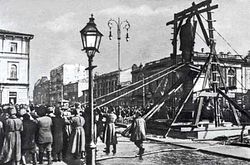
In 1917, the bolsheviks tore down the monument to Stolypin in Kiev.
Immediately after the funeral, people began to raise money for erecting a monument to Stolypin. It was unveiled on September 1, 1912, opposite the Kiev City Council. Cut in the pedestal were Stolypin's words addressed to revolutionaries of all kinds: "You need great upheavals, but we need great Russia." And more: "I firmly believe that the light of the Russian national idea that was lit in the west of Russia will not fade away, but will soon illumine all Russia." The front side of the monument bore the inscription: "To Petr Arkadievich Stolypin, from the Russian people."
The Kievlyanin newspaper reported in 1911 that the peasants of the village of Stolypino laid the foundation of a church to commemorate the martyrdom of Stolypin.[9] 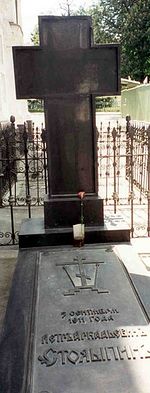
Stolypin's grave in the Kiev-Caves Lavra.
Among a great number of posthumous speeches, articles, telegrams, letters, and books in which Stolypin's personality was duly appreciated at last, there was a letter from the peasants of the village of Kruts, Saratov Region, which Olga Stolypina cherished most of all. It came three months after Stolypin's death and read: "He has always been kind and considerate to us, on which account we had an opportunity to build a new, beautiful church in our small village, in which we find a great comfort; also with his help and active participation we purchased a plot which belonged to Petr Arkadievich—now a guarantee of our well-being... Kindly accept from us the most sincere and cordial sympathy and condolences upon the irretrievable loss of such an affective and noble leader, citizen, and sincere believer. His memory will be cherished in our village as long as there is the church of God standing in it as a permanent witness to Petr Arkadievich's kindness to us."[10]

